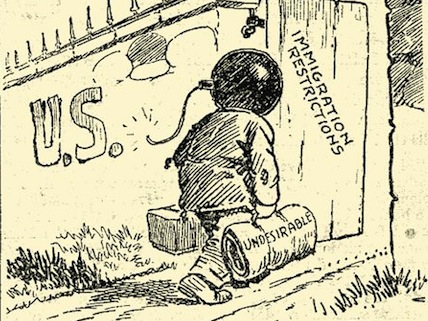Everything old is new again.
Please bear the following facts in mind.
If you and your family are trying to escape the Chinese government’s coercive population control
policies — if, for example, you are a man, and your wife has been forced into an abortion by threats or violence from the government, and even if you, yourself, have been threatened with government-forced sterilization; or if you are a woman, and you have been forced into an abortion by the government, but you don’t want to be forced to live apart from your life partner — if, that is, either you or your life partner has been held down, under threat of violence, and had your reproductive organs cut into, against your will, by order of the State, and it’s perfectly likely to happen to you again if you go on living in China — well, then, I’m sorry, but that just isn’t a good enough reason for the United States government to consider you and your family Officially Persecuted by the Chinese government, and thus not enough for them to get out of your way and leave you alone to live your life peacefully within the borders that the U.S. government claims the right to fortify. They are especially unlikely to consider your persecution important enough to merit asylum if the Chinese government, as part of those same population control
policies, refuses to write down a legal record of your marriage to the man or woman that you wed years ago and have lived with ever since. In fact a panel of comfortable American judges will sneer down at you, from their politico-moral high ground, that legal marriage reflects a sanctity and long-term commitment that other forms of cohabitation simply do not.
Your actual, real-life marriage doesn’t count, because the government that is persecuting you won’t recognize it. Your suffering and the violation of your body, or your spouse’s body, by a violent government, don’t matter to this government, because it won’t count them as real persecution. So instead of leaving you alone, this government will roust you up out of your new home, and march you out at bayonet-point, and ship you out of the country, back to the tormentors in China who you risked everything to escape.
If you are a woman from the Republic of Guinea, and, when you were a child, you were held down and had your clitoris cut out with a knife, without anesthesia, and if, after being forced to suffer this painful and traumatizing mutilation of your body, you make a deliberate decision to get out of the country, perhaps because it hurt you, and perhaps because the effects still hurt you, and perhaps because you didn’t want it and now you just can’t stand to live in the place where it was done to you, and perhaps because you don’t want your daughters to be forced into the same thing — well, I’m sorry, but according to the United States Department of Homeland Security and the United States Department of Justice [sic], that just isn’t a good enough reason to consider you Officially Persecuted in Guinea, and thus not enough reason for them to get out of your way and leave you alone to live your life peacefully within the borders that the U.S. government claims the right to fortify. Because, hey, you’re damaged goods now and you don’t have any clitorises left for them to cut out. Your suffering and the violation of your body, by certain violent members of your community, don’t matter to them, because it won’t count them as real persecution. So instead of leaving you alone, this government will roust you up out of your new home, and march you out at bayonet-point, and ship you out of the country, back to the tormentors in Guinea who you risked everything to escape.
If you and your family are from Iraq, and, because of the crushing poverty and the tremendous danger to your life and limb which you face — due to the United States government’s own war and bombing and occupation in Iraq; or due to threats from the government-backed and freelance ethnic-cleansing death squads, which have flourished under that occupation; or due to the crossfire in the endless battles between the United States government’s occupying forces and Iraqi insurgents — if, because of all that, you are one of the 2.5 million Iraqis who have fled the country in order to try to find a new home (either temporarily or permanently) where you can live your life free of fear and starvation and unspeakable daily violence, and now you find yourself stuck — like 2.4 million of your fellow Iraqis — in some hellhole refugee camp or urban ghetto in neighboring countries like Syria or Jordan, where conditions are awful, where you are surrounded by suffering, where you cannot legally work for pay and have little or nothing to do other than take hand-outs and fill out paperwork for UNHCR, while you watch your life savings drain away in the effort to keep yourself alive for a few more months while you wait, and wait, and wait, and if you don’t happen to be one of the 500 people per year who are eligible for Special Immigration Visas
in return for collaborating with the U.S. government’s occupying forces in Iraq, and you don’t happen to be one of the quota of only a few thousand Iraqi refugees that the U.S. government has agreed to accept
each year — well, then, I’m sorry, but according the United States government that just isn’t a good enough reason to get out of your way and leave you alone to travel to the United States and live your life peacefully within the borders that the United States government claims the right to fortify. Your suffering, and the danger to your life or the lives of your loved ones, by any one of the countless armies and armed factions rampaging through Iraq, don’t matter enough to them for them to reconsider their immigration quota policy. So this government will keep you penned up in your hellhole ghetto, where you can die for all they care, or, if you somehow get to America, this government will march you out at bayonet-point, and ship you out of the country, back to the ghetto conditions or to the tormentors in Iraq who you risked everything to escape.
This is life, such as it is, under government immigration controls. It is life as it always will be, as long as politicians and bureaucrats have the power to pick and choose whose reasons for wanting to cross an arbitrary line on a map are good enough, and whose are not.
But it is criminal that there is even one single refugee in this world who cannot immediately find asylum and a chance to make a new life and a new home for herself in a new country.
It is inexcusable that, in the name of the ethno-political system of international apartheid, the governments of the world continue to collaborate in violence against women, in forced starvation, and in ethnic cleansing, by forcing peaceful women and men into refugee ghettoes or, worse, by forcing peaceful women and men back into the maws of the very governments or violent factions who intend to devour them.
It is obscene that a bunch of politicians and unaccountable bureaucrats from the United Nations or the U.S. government would be invested with the power to sit in judgment, from their comfortable offices, on the most marginalized, the most exploited, and the most oppressed people in the world, so that they put all their conventional prejudices and political blinders to work in picking and choosing whose suffering should count as real, in the eyes of the governments of the world, or whose suffering, if acknowledged as real by the government, is important enough to let them into a tiny quota that the government will allow
to cross an arbitrary line on a map.
The S.S. St. Louis still sails the seas today, a ghost ship with ghost passengers, without rest and without safe harbor. It will haunt the world forever, as long as this system of international apartheid is enforced.
And all for what? To avoid the voluntary co-mingling of people from different countries? To ensure that the people of the world hear only one language, live and work with people of only one nationality, remain segregated, either by penning them up in their government-appointed place
or else by making sure you can monitor all their movements according to a government-created system of passbooks and minders? The idea would be laughable if not for all the ghosts–the ghosts of millions upon millions of real, living, irreplaceable and unique individual people, who were turned back, ruined, persecuted, mutilated, tortured, starved, and murdered for the sake of that idea.
There is another way. A way in which the living can finally live, and the dead can finally rest, in peace. But that other can only become a reality when people are free to move from one place to another, and their reasons, their suffering, and their lives cannot be measured and found wanting by entitled strangers with the power to turn them back and force them back to the tormenters that they risked everything to escape. It can, that is to say, only become a reality with the immediate, unconditional, and complete abolition of all government border controls, and with universal amnesty for all currently undocumented immigrants.
There's no room for compromise or moderation in the politics of immigration when real people's bodies and real people’s lives are hanging in the balance. As they are all over the world today.
See also:


